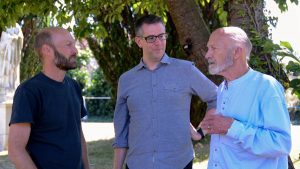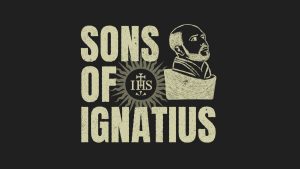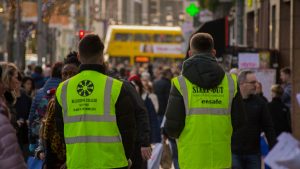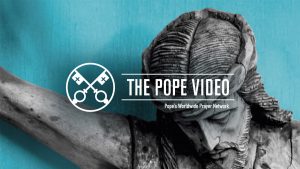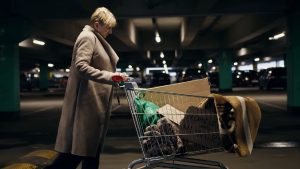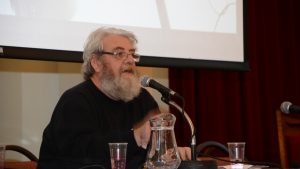Resisting the Lord’s Resistance Army
 John Guiney describes the dreadful experience of huge numbers of Ugandan children, the prey of a rebel force known as the Lord’s Resistance Army (LRA), who regularly round up village children and force them into prostitution or into the ranks of their own militia.
John Guiney describes the dreadful experience of huge numbers of Ugandan children, the prey of a rebel force known as the Lord’s Resistance Army (LRA), who regularly round up village children and force them into prostitution or into the ranks of their own militia.
Night time in Gulu, northern Uganda, is haunting. On roads and streets in town there are streams of unaccompanied children flowing in from the surrounding villages, seeking shelter and security for the night. They sleep in churches and schools, under trees, on the pavement, any place they find space and safety. Out there in their villages there is a lurking enemy prowling around, seeking to capture children for their vicious war. They are called the Lord’s Resistance Army (LRA). They prefer to do their evil work at night.
Parents send their children to the towns to save them from the enemy. When dawn breaks, the children walk back to their homes, and some prepare to go to school. These children have become known as the night commuters of northern Uganda. Over 20,000 children have been abducted by the LRA; the girls have been made into sex slaves and boys child soldiers. Those who do not cooperate are killed by their colleagues who are brainwashed into the killing.
The LRA has been a constant threat to the most vulnerable for the past nineteen years in northern Uganda and across the border in South Sudan. They have abducted thousands of children and committed heinous atrocities against people. They are led by a man called Joseph Kony, a former altar boy, who declared war on the Government of Uganda and wants to install a theocracy based on the Ten Commandments.
This conflict has displaced more than one million people in the Archdiocese of Gulu, people forced to live in “protected villages”, refugee camps in their own country. However, these protected villages are worse than refugee camps because they are extremely overcrowded and have very limited and irregular provision of services of food and medical, educational and shelter programs as do normal refugee camps. Access to these villages is dangerous and difficult for humanitarian organizations, as was proven in early November this year.
In the Pader District of northern Uganda, Gulu Archdiocesan Caritas staff, travelling to the camps, were gunned down by the LRA. They had been the most committed and dedicated to the service of their people in the camps. It was the first time humanitarian workers were deliberately targeted and killed by the LRA. This seems to be an act of vengeance by the LRA against humanitarian and church workers, done in response to an intervention by the international community.
In October, the International Criminal Court of Justice (ICC), which has the mandate to investigate and bring to justice persons who bear responsibility for crimes against humanity, have named and put out arrest warrants for several people, including Joseph Kony. Paradoxically, this has created more insecurity for the local people and for humanitarian workers. In the past week another British humanitarian worker has been killed by the LRA on the Sudan border.
Jesuit Refugee Service (JRS), the outreach of the Jesuits to refugees and internally displaced persons, has six educational and psychosocial projects along the Sudan/ Ugandan border. Three of the six projects are only accessible by armed escort or by plane because of LRA activity. In 2003, outside Kitgum, JRS staff member John, a driver of the Lobone project, was ambushed and shot with three of his passenger, two children and one woman.
In 2000, the Uganda Parliament passed the Amnesty Act, which offered amnesty to all the Ugandans engaged in acts of rebellion against the Government since January 1986, on condition that they report to a local authority, abandon the rebellion, and surrender all weapons. This, however, has had mixed results. Many people, who have come out, have complained of harassment and forced recruitment into the UPDF (Uganda People’s Defence Force). The Ugandan government has also been in denial of the atrocities their army has committed in this vicious war.
The North-South Sudan Comprehensive Peace Agreement has brought lots of hope that peace will prevail in Sudan and across the border in Uganda. Some people in exile have begun to return while others have once again taken flight to Uganda and Kenya because of LRA insecurity within South Sudan. The security situation on the ground in the Nimule corridor of South Sudan and as far west as Yei has in fact deteriorated. The LRA movement into the Congo through the West Nile area of northern Uganda a few weeks ago has caused great insecurity in this area. One year after the peace agreement more insecurity rather than real peace has emerged.
Recommendations:
The African Union and the international community must make a robust intervention with the Ugandan government about assuring the security of their own citizens. Many northerners complain that the government does not really care and have allowed this vicious war to continue because it serves the government’s interests. They complain that the Ugandan Gov and army are more interested in looting Eastern Congo than paying attention to the economic, social and security problems of northern Uganda.
1. The international community must call upon the Ugandan government to seriously seek a peaceful rather than a military solution to the war in the north. The Irish government and people must make their voice heard, since for years Ireland has funded the government of Uganda with millions of Euro. The continuing of aid by the Irish government must be linked to human rights for all in Uganda.
2. The Ugandan government should be aggressive to put an end to violations of human rights, not only by LRA fighters but also by their own army.
3. The Ugandan government should secure and assure access by humanitarian organizations who serve the displaced within Northern Uganda.
The LRA continues to terrorise the people of Northern Uganda and the Ugandan/Sudanese border. The parents and their children cry out to us this Christmas for a safe place to lay their head in peace.


